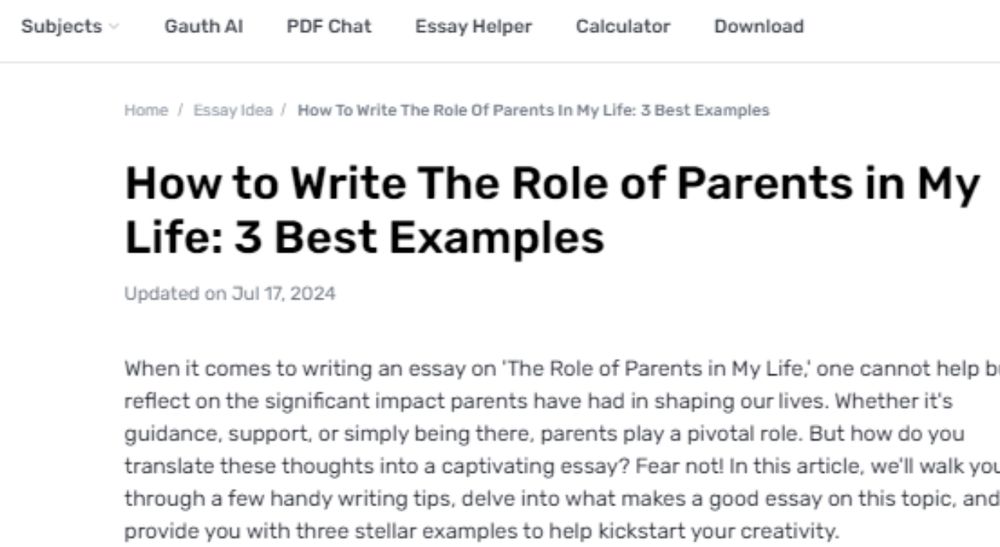Self-esteem, or one’s opinion and worth of oneself, is essential to one’s growth and well-being. Parents essentially shape their child’s self-esteem through their intuitive, demeanors, and behaviors. Their steady support, affectionate support, and valuable criticism foster a positive self-image. Alternately, negative comments or unlikely desires can weaken a child’s self-worth.
Understanding the Role Of Parents In My Life and the effect of parental impact highlights the significance of positive support and supporting demeanors. By advertising unconditional adore and approval, guardians offer assistance to construct a strong establishment of self-esteem that supports their child’s development and flexibility. Recognizing how parental activities influence self-worth underscores the require for careful, steady child rearing to guarantee children create a solid sense of self and certainty.
Early Foundations of Self-Esteem
From birth, guardians are the essential source of enthusiastic bolster and approval for their children. The way guardians connect with their children during developmental years sets the basis for self-esteem. Positive fortification, loving intuition, and steady bolster offer assistance to children to create a sense of self-worth and certainty.
Attachment and Security
The enthusiastic bond between parents and their child, known as connection, altogether impacts self-esteem. A secure connection, characterized by responsive and supporting child rearing, cultivates a sense of security and having a place. This foundation permits children to investigate their environment with certainty and create a positive self-image.
Warmth and Approval
Customary expressions of adore and assertion from guardians contribute to a child’s self-esteem. When guardians appear fond and recognize their child’s accomplishments, it strengthens the child’s sense of esteem. Compliments, support, and positive input offer assistance to children internalizing their worth and constructing certainty.
Desires and Accomplishment
High parental desires can persuade children to endeavor for fabulousness, but they can too make undue stretches. When guardians set unlikely objectives or compare their child to others, it can lead to sentiments of insufficiency and disappointment. Adjusting desires with reasonable objectives makes a difference keep up a positive self-image.
Feedback and Self-Perception
Criticism, particularly when conveyed brutally or unreasonably, can dissolve a child’s self-esteem. Negative comments about a child’s capacities, appearance, or behavior can lead to self-doubt and frailty. Useful feedback, on the other hand, should be conveyed with affectability and pointed at particular behaviors instead of the child’s character.
Self-Esteem as a Model
Parents who illustrate solid self-esteem and positive self-regard give a show to their children. When guardians display self-confidence, self-compassion, and versatility, they educate their children to esteem themselves and adapt to challenges successfully.
Attitudes Toward Mistakes
How guardians handle their possess botches and mishaps impacts their children’s self-esteem. Guardians who demonstrate versatility, self-forgiveness, and a development attitude instruct their children to see challenges as openings for development instead of as reflections of their worth.
Impact of Child rearing Styles
The fashion of parenting authoritative, dictator, tolerant, or uninvolved affects a child’s self-esteem. Each fashion has unmistakable characteristics and suggestions for how children see themselves.
Authoritative Parenting
Definitive guardians combine warmth with structure, giving back and direction while keeping up clear desires. This adjusted approach cultivates positive self-esteem as children feel esteemed and caught on, and they learn to appreciate their worth through steady input and boundaries.
Dictator Parenting
Dictator guardians implement strict rules and high desires without much warmth or passionate bolster. This fashion can weaken self-esteem, as children may feel their esteem is based exclusively on meeting outside measures instead of their inherent worth.
Permissive Parenting
Lenient guardians are warm and tolerant but need consistency in setting boundaries. Whereas this approach can cultivate a sense of flexibility, it may lead to issues with self-discipline and self-esteem on the off chance that children don’t learn to adjust their wants with duty.
Uninvolved Parenting
Uninvolved guardians give negligible enthusiastic back and direction. This need for engagement can contribute to low self-esteem, as children may feel dismissed or insignificant. Reliable consideration and association are fundamental for building a positive self-image.
Support and Praise
Giving particular, veritable laud for endeavors and achievements makes a difference when children recognize their qualities and capacities. Empowering them to set and accomp
Ish individual objectives cultivate a sense of competence and self-worth.
Dynamic Tuning in and Back
Effectively tuning in to a child’s contemplations and sentiments illustrates regard and approval. Supporting their interface and desires, indeed when they contrast with parental desires, strengthens their sense of independence and self-esteem.
Advancing Versatility
Educating children to handle disappointments and misfortunes with flexibility builds self-esteem. Empowering a development mentality, where challenges are seen as openings for learning and change, makes a difference in children creating a positive self-concept and certainty in their capacities.
Three Easy Steps to Simplify Essay Writing with Gauth
Enter the topic of your essay into Gauth, use its help to create a draft, and then go back and modify the text to create a polished, unique final essay. Simple and effective!

Enter Your Information Here
Give your essay’s topic or draft to Gauth AI. To provide context for the AI, you may either enter directly or upload documents.
Make a Draft
To produce an organized draft, use Gauth AI. The AI will assist with content creation, coherence checking, and outline formation.
Review Essay
Review and edit the document that the AI created. Make final revisions, add your voice to the essay, and make sure it satisfies your standards.
Conclusion
Parents play a pivotal part in forming their child’s self-esteem through their interactions, expectations, and behaviors. By giving warmth, setting reasonable desires, serving as positive part models, and utilizing strong child-rearing hones, guardians can altogether impact their child’s sense of self-worth.

